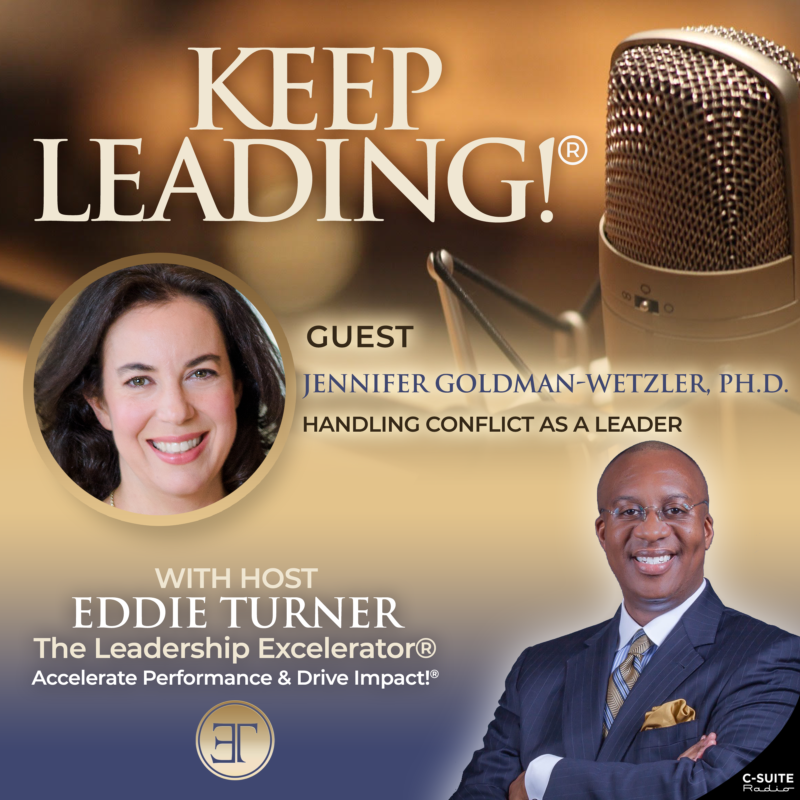Handling Conflict as A Leader
Handling Conflict as A Leader https://csuiteold.c-suitenetwork.com/advisors/wp-content/themes/csadvisore/images/empty/thumbnail.jpg 150 150 Eddie Turner https://secure.gravatar.com/avatar/8cdad03e595f4ba6adbe296c3e4365e8?s=96&d=mm&r=g
Visit KeepLeadingPodcast.com to access the full content for this episode!
Hello, everyone! I am Eddie Turner, The Leadership Excelerator®. In this episode of the Keep Leading!® podcast (#107), I interview Dr. Jen Goldman-Wetzler. She is an organizational psychologist and the founder & CEO of Alignment Strategies Group. We discuss “Handling Conflict as a Leader.” Jen explains how to deal with conflict and achieving conflict resolution. Here’s some of the information you’ll learn in this podcast.
What is Conflict?
Conflict is part of our human experience. For some, it’s part of daily life. We may notice conflict emerging when we interact with someone, and it does not feel right. We may find ourselves intentionally avoiding someone, or we may not treat someone the way we should.
For a leader, an ineffective resolution of conflict can derail success at work and home. However, there are times when conflict can be a healthy element of life. In business, for example, it can lead to creativity and innovation— particularly when you have teams with diverse perspectives.
Situations When Conflict is Destructive for a Leader
As a leader, you must identify when a conflict is healthy and is helping you be more innovative and when it is not and therefore detrimental.
Destructive Conflict Situations
- When you are going around and around in circles and not getting the required answers
- When you are not coming up with the solutions that you thought you were going to.
- When you feel like banging your head up against the wall while trying to get your team to do something different, but they are resisting and not doing it.
- The ‘under the surface’ kind of conflict that bubbles up now and again and then dies down only to explode later, which you do not want to see or do anything about it.
People often get stuck on a conflict loop going around and around without any outcome due to certain conflict habits.
The Four Conflict Habits
- We avoid conflicts because we don’t know what to do about them. So we either blame other people or blame and shame ourselves.
- We shut down in the face of recurring conflict.
- We relentlessly seek collaboration with other people and yet fail to get anywhere.
- We waste time, energy, money, and resources- trying to achieve a ‘win-win’ solution with someone who does not cooperate with us.
Each of these four habits can be useful and can lead to healthy conflict outcomes unless a leader uses it habitually.
Handling Conflict
As a leader, dealing with destructive conflict situations or conflicting habits is about freeing yourself from them. If even one person makes a change, the entire relationship can get better in conflict situations.
Steps for Handling Conflicts as A Leader
Step 1 Stop, pause, and notice what is going on.
Step 2 Identify the conflict habit.
Step 3 Break the habitual response pattern.
- If a person shuts down during conflict, you need to cool off over a weekend or let it go for a few days. It can jolt the other person out of their habitual way.
- If a person has a conflict-avoiding habit, have a conversation with them. Share the truth with love, care, and respect.
Step 4 Be more direct in letting others know what you need.
Step 5 Empower yourself by learning negotiation skills to resolve conflicts with a win-win outcome.
Eddie Turner is the Keep Leading!® podcast host—a podcast dedicated to leadership development and insights. Subscribe and Share wherever you get your podcasts. Follow Eddie Turner on LinkedIn, Twitter, Instagram, or Facebook! Visit www.EddieTurnerLLC.com to learn more!

